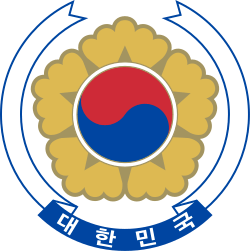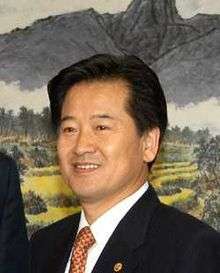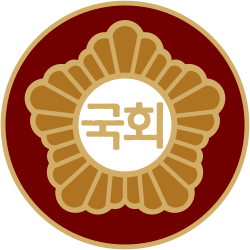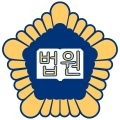South Korean legislative election, 2020
|
| ||||||||||||||||||||||||||||||||||||||||||||||||||||||
| ||||||||||||||||||||||||||||||||||||||||||||||||||||||
All 300 seats of the National Assembly 151 seats needed for a majority | ||||||||||||||||||||||||||||||||||||||||||||||||||||||
|---|---|---|---|---|---|---|---|---|---|---|---|---|---|---|---|---|---|---|---|---|---|---|---|---|---|---|---|---|---|---|---|---|---|---|---|---|---|---|---|---|---|---|---|---|---|---|---|---|---|---|---|---|---|---|
| ||||||||||||||||||||||||||||||||||||||||||||||||||||||
| ||||||||||||||||||||||||||||||||||||||||||||||||||||||
 |
|---|
| This article is part of a series on the politics and government of the Republic of Korea |
| Constitution |
|
Judiciary |
South Korea's 21st legislative election will be held on 15 April 2020. All 300 members of the National Assembly will be elected with 253 from first-past-the-post constituencies and 47 from proportional party lists. The electoral system and number of the members of the National Assembly could change before the election in 2020 due to the constitutional amendments and electoral reforms proposed by the incumbent president, Moon Jae-in.[1]
Electoral system
300 members of the National Assembly were elected in the 2016 elections, of whom 253 (84%) were elected from single-member constituencies on a first-past-the-post basis, and 47 (16%) from closed party lists through proportional representation by the Hare quota largest remainder method, in accordance with South Korea's Public Official Election Act.[2] In order to win seats through proportional representation, parties needed to pass an election threshold of either 5 single-member districts or 3% of the total list vote.[3]
Restrictions on candidates
Candidates for the National Assembly were required to pay a fee of 15,000,000 South Korean won (US$14,000 as of December 2017), and under the National Security Act the Constitutional Court may block the registration of "left-wing", "pro–North Korean" parties, though this provision had not affected the recent elections.[4]
Date and process
The 2020 election for the National Assembly will be held on April 15, in accordance with Article 34 of the Public Official Election Act, which specifies that Election Day for legislative elections is held on "the first Wednesday from the 50th day before the expiration of the [National Assembly members'] term of office".[5] Eligible voters were required to be registered and at least 19 years old on the day of the election,[4] and needed to show an approved form of identification at the polling place. Polls on Election Day will be open from 6 a.m. to 6 p.m. Korea Standard Time (21:00–09:00 UTC, April 14–15).[6]
Since 2009, voters have been able to vote overseas.[4] The electorates can also cast early votes at polling stations in Korea without prior notice.[7]
Parties and candidates
Five major parties will contest the 2020 election:
- The Democratic Party, led by Lee Hae-chan, the liberal ruling party.
- The Liberty Korea Party, the main conservative opposition party.
- The Bareunmirae Party, led by Son Hak-gyu, a centre to centre-right party formed in early 2018 as a merger of People's Party and the Bareun Party.
- The Party for Democracy and Peace, led by Chung Dong-young, a liberal party, formed in early 2018 from a split from the People's Party.
- The Justice Party, led by Lee Jeong-mi, a left-wing progressive party.
Two other parties have one member in the current National Assembly: the left-wing nationalist Minjung Party and far-right pro-Park Korean Patriots' Party.
Opinion polls
Opinion polls have been carried out for the South Korean legislative election in 2020.
2018
| Date | Polling firm | Democratic | Liberty Korea | Bareunmirae | Democracy and Peace | Justice | Others | Lead | |||||||
|---|---|---|---|---|---|---|---|---|---|---|---|---|---|---|---|
| 21-23 August 2018 | Gallup Korea | 42 | 11 | 5 | 1 | 15 | 1 | 27 | |||||||
| 13-17 August 2018 | Realmeter | 39.6 | 19.9 | 7.3 | 2.4 | 13.3 | 1.7 | 19.7 | |||||||
| 4-5 August 2018 | ResearchView | 41.9 | 15.8 | 6.6 | 1.2 | 17 | 2.4 | 24.9 | |||||||
| 31 July- 2 August 2018 | Gallup Korea | 41 | 11 | 5 | 1 | 15 | 0 | 26 | |||||||
| 23-27 July 2018 | Realmeter | 44 | 18.6 | 7 | 2.9 | 12.5 | 1.6 | 25.4 | |||||||
| 10-12 July 2018 | Gallup Korea | 49 | 10 | 6 | 0.3 | 10 | 0 | 39 | |||||||
| 9-11 July 2018 | Realmeter | 44.3 | 16.8 | 6.3 | 2.8 | 12.4 | 2.6 | 27.5 | |||||||
| 2-6 July 2018 | Realmeter | 47.5 | 18.3 | 5.8 | 2.9 | 10.4 | 2.6 | 29.2 | |||||||
| 30 June-1 July 2018 | ResearchView | 48 | 20 | 5 | 4 | 12 | 4 | 28 | |||||||
| 26-28 June 2018 | Gallup Korea | 52 | 10 | 5 | 1 | 9 | 1 | 42 | |||||||
| 25-27 June 2018 | Realmeter | 47.8 | 18.3 | 5.3 | 2.3 | 10.1 | 2.6 | 29.5 | |||||||
| 18-20 June 2018 | Realmeter | 53.6 | 17.4 | 5.2 | 2.7 | 7.9 | 1.9 | 36.2 | |||||||
| 13 June 2018 | Local Elections | 51.4 | 27.8 | 7.8 | 1.5 | 9 | 2.5 | 23.6 | |||||||
| 2018 local elections | |||||||||||||||
| 28 May-1 June 2018 | Realmeter | 52.2 | 19.8 | 5.6 | 2.9 | 6.3 | 1.9 | 32.4 | |||||||
| 23-24 May 2018 | Gallup Korea | 53 | 13 | 5 | 1 | 4 | 0 | 40 | |||||||
| 14-18 May 2018 | Realmeter | 54.2 | 18.7 | 5.7 | 3.4 | 5.8 | 1.5 | 35.5 | |||||||
| 5-6 May 2018 | ResearchView | 55 | 20 | 7 | 2 | 6 | 2 | 35 | |||||||
| 28-29 April 2018 | KSOI | 58.8 | 11 | 6.8 | 0.6 | 4.2 | 2 | 47.8 | |||||||
| 9-13 April 2018 | Realmeter | 50.4 | 21.9 | 5.7 | 3.3 | 4.2 | 1.9 | 28.5 | |||||||
| 26-30 March 2018 | Realmeter | 51.3 | 20.7 | 6.8 | 2.4 | 5.2 | 2.2 | 30.6 | |||||||
| 20-22 March 2018 | Gallup Korea | 47 | 14 | 6 | 1 | 5 | 0 | 33 | |||||||
| 26 February-2 March 2018 | Realmeter | 50 | 19.7 | 6.8 | 3 | 4.5 | 2.6 | 30.3 | |||||||
| 20–22 February 2018 | Gallup Korea | 48 | 11 | 8 | 1 | 6 | 1 | 37 | |||||||
| 11–14 February 2018 | Kantar Public | 47.9 | 14.9 | 8.1 | 1.6 | 5.6 | 1.3 | 33 | |||||||
| 5–9 February 2018 | Realmeter | 44.4 | 19.1 | 11 | 4.2 | 7 | 2.1 | 25.3 | |||||||
2016 to 2017
| Date | Polling firm | Democratic | Liberty Korea | People's | Bareun | Justice | Others | Lead | |||||||
|---|---|---|---|---|---|---|---|---|---|---|---|---|---|---|---|
| 18–22 December 2017 | Realmeter | 52.0 | 17.8 | 4.9 | 5.7 | 5.2 | 1.6 | 34.2 | |||||||
| 5–7 December 2017 | Gallup Korea | 46 | 11 | 5 | 8 | 5 | 0 | 35 | |||||||
| 18–19 November 2017 | Research & Research | 49.0 | 11.8 | 5.5 | 6.3 | 5.4 | 0.8 | 37.2 | |||||||
| 30 October–1 November 2017 | Realmeter | 50.9 | 17.5 | 6.6 | 4.4 | 5.7 | 2.3 | 33.4 | |||||||
| 13–14 October 2017 | KSOI | 49.7 | 12.2 | 6.9 | 5.2 | 5.6 | 1.7 | 37.5 | |||||||
| 18–20 September 2017 | Realmeter | 49.8 | 17.0 | 6.0 | 6.3 | 4.7 | 2.8 | 32.8 | |||||||
| 28–30 August 2017 | Realmeter | 52.2 | 16.8 | 6.2 | 6.5 | 6.0 | 1.7 | 35.4 | |||||||
| 4–6 July 2017 | Gallup Korea | 50 | 14 | 4 | 8 | 6 | 0 | 36 | |||||||
| 10–12 May 2017 | Realmeter | 44.7 | 13.0 | 8.8 | 8.3 | 9.6 | 1.3 | 31.7 | |||||||
| 2017 presidential election | |||||||||||||||
| 26 April 2017 | Research & Research | 38.8 | 12.9 | 20.3 | 5.7 | 6.3 | 0.3 | 18.5 | |||||||
| 11–13 April 2017 | Gallup Korea | 41 | 9 | 24 | 4 | 4 | 0 | 17 | |||||||
| 14 March 2017 | Hankook Research | 39.4 | 10.5 | 9.3 | 4.8 | 5.2 | 2,9 | 28.9 | |||||||
| Impeachment of Park Geun-hye | |||||||||||||||
| 1–2 February 2017 | Realmeter | 36.4 | 11.6 | 12.1 | 7.9 | 4.8 | 2,7 | 24.8 | |||||||
| 28–30 January 2017 | JoWon C&I | 36.9 | 12.3 | 11.9 | 8.8 | 5.0 | 3,0 | 24.6 | |||||||
| 10–12 January 2017 | Gallup Korea | 41 | 12 | 10 | 7 | 3 | 0 | 29 | |||||||
| 2016 South Korean political scandal | |||||||||||||||
| 24–26 October 2016 | Realmeter | 30.5 | 26.5 | 14.4 | - | 4.5 | 3.9 | 4.0 | |||||||
| 26–30 September 2016 | Realmeter | 28.8 | 33.0 | 13.9 | - | 4.5 | 3.6 | 4.2 | |||||||
| 27–28 August 2016 | ResearchView | 30.6 | 27.6 | 14.3 | - | 7.4 | 0.7 | 3.0 | |||||||
| 31 July–1 August 2016 | R&Search | 23.0 | 33.5 | 11.8 | - | 5.6 | - | 10.5 | |||||||
| 28–30 June 2016 | Gallup Korea | 23 | 30 | 14 | - | 6 | 0 | 7 | |||||||
| 30 May–1 June 2016 | Realmeter | 29.8 | 30.1 | 17.7 | - | 7.6 | 2.9 | 0.3 | |||||||
| 19–21 Apr 2016 | Gallup Korea | 24 | 30 | 25 | - | 7 | 0 | 5 | |||||||
| 13 Apr 2016 | 2016 elections (PR) | 25.5 | 33.5 | 26.7 | - | 7.2 | 6.9 | 8.0 | |||||||
- General notes
- Gallup Korea provides poll results only to the nearest whole number.
References
- ↑ "지방선거 득실 계산… 민주당-한국당, 접점없는 '개헌' 대치". Donga Ilbo. Naver. Retrieved 25 December 2017.
- ↑ Article 189, subsection (3), Public Official Election Act, "Legislation & Judicial Decision". Republic of Korea National Election Commission. Retrieved 9 April 2016.
- ↑ "Election Districts and Representation System". Republic of Korea National Election Commission. Retrieved 12 April 2016.
- 1 2 3 "South Korea". Sustainable Governance Indicators. Retrieved 9 April 2016.
- ↑ Article 34, Public Official Election Act, "Legislation & Judicial Decision". Republic of Korea National Election Commission. Retrieved 9 April 2016.
- ↑ "National Assembly elections: April 13, 2016". Republic of Korea National Election Commission. Retrieved 12 April 2016.
- ↑ Lee, Rachel (8 April 2016). "Early voting begins for general election". The Korea Times. Retrieved 9 April 2016.





